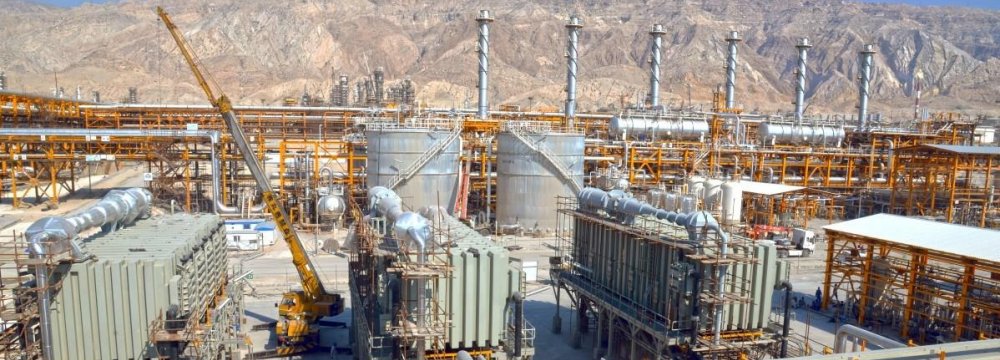
South Pars Raises Output to Meet Growing Gas Demand

Behzad Mohammadi, chief executive officer of Oil Industries' Engineering and Construction Company, said the production of South Pars phases 20 and 21 has exceeded 58 million cubic meters per day, about 3.5% higher than their nominal output capacity, NIOC's news portal reported on Saturday.
He said the onshore refinery of SP phases 20 and 21, which comprise four processing units or "trains", has also exceeded its nominal refining capacity by pumping 51.4 million cubic meters a day into the national gas distribution pipeline.
Phases 20 and 21 were part of five South Pars phases that officially went on stream in April last year. They are designed to produce 56 mcm/d of natural gas, 75,000 barrels per day of gas condensate, 500 tons of sulfur and 2 million tons of propane, butane and ethane annually.
South Pars production has been stabilized at a rate of 550 mcm/d, officials say, a level that alleviates concerns over gas shortages in the face of rising demand in winter to heat up buildings.
The gas field is shared between Iran and Qatar and constitutes two-thirds of Iran's gas production.
Majid Boujarzadeh, spokesman of the National Iranian Gas Company, said on Saturday gas demand in the residential sector is expected to exceed 500 mcm/d from around 465 mcm/d as cold weather and storm continue to grip many regions across Iran.
"Close to 106 million cubic meters per day of gas are used in power stations and exports amount to 36 mcm/d," he said.
Supplies to Iraq stand at around 12 mcm/d and the rest is transferred to Turkey.
Iran faced an unexpected gas crisis at the beginning of last year, as Turkmenistan abruptly cut supplies to make Iran pay nine times the price of their gas contract.
Iran took in limited amounts of gas from Turkmenistan in the northeast to supply gas to northern regions straddling the Caspian Sea coast.
Officials say the same will not happen this year, as the country expedited the extension of pipelines carrying South Pars gas to the north.
South Pars is being developed in 24 phases. Iran said it caught up with Qatar's rate of extraction from the joint field in April after the launch of five phases. Iran produced over 155 billion cubic meters of gas from South Pars in the fiscal 2016-17.


Trump weighs using $2 billion in CHIPS Act funding for critical minerals

Codelco cuts 2025 copper forecast after El Teniente mine collapse

Electra converts debt, launches $30M raise to jumpstart stalled cobalt refinery

Barrick’s Reko Diq in line for $410M ADB backing

Abcourt readies Sleeping Giant mill to pour first gold since 2014

Nevada army depot to serve as base for first US strategic minerals stockpile

SQM boosts lithium supply plans as prices flick higher

Viridis unveils 200Mt initial reserve for Brazil rare earth project

Tailings could meet much of US critical mineral demand – study

Kyrgyzstan kicks off underground gold mining at Kumtor

Kyrgyzstan kicks off underground gold mining at Kumtor

KoBold Metals granted lithium exploration rights in Congo

Freeport Indonesia to wrap up Gresik plant repairs by early September

Energy Fuels soars on Vulcan Elements partnership

Northern Dynasty sticks to proposal in battle to lift Pebble mine veto

Giustra-backed mining firm teams up with informal miners in Colombia

Critical Metals signs agreement to supply rare earth to US government-funded facility

China extends rare earth controls to imported material

Galan Lithium proceeds with $13M financing for Argentina project

Kyrgyzstan kicks off underground gold mining at Kumtor

Freeport Indonesia to wrap up Gresik plant repairs by early September

Energy Fuels soars on Vulcan Elements partnership

Northern Dynasty sticks to proposal in battle to lift Pebble mine veto

Giustra-backed mining firm teams up with informal miners in Colombia

Critical Metals signs agreement to supply rare earth to US government-funded facility

China extends rare earth controls to imported material

Galan Lithium proceeds with $13M financing for Argentina project

Silver price touches $39 as market weighs rate cut outlook

















